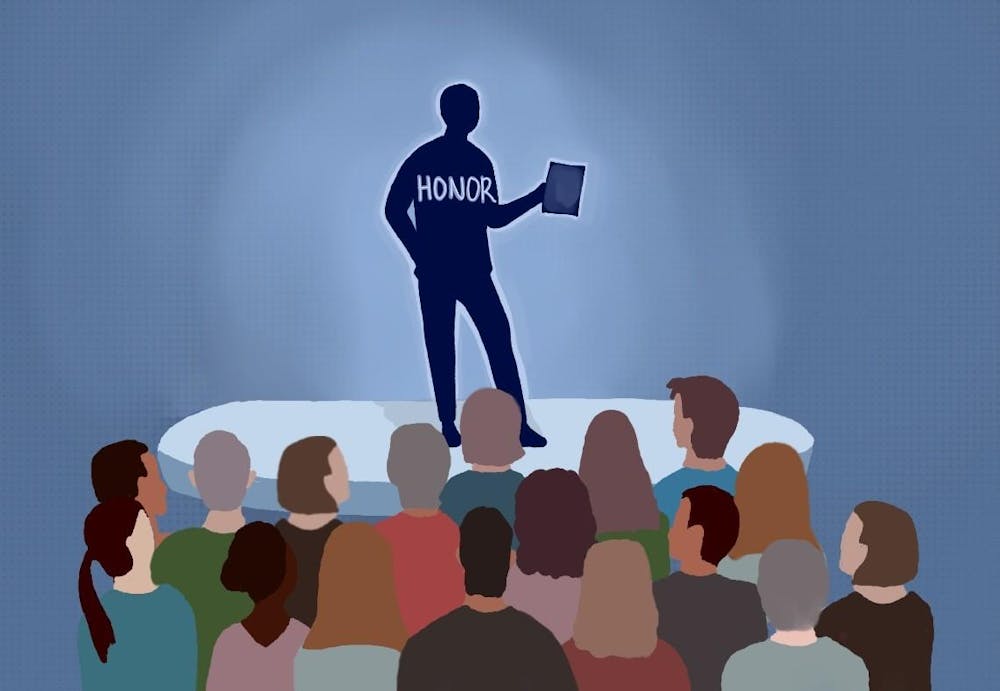With first-year students preparing to sign the Honor Code at commencement, the Honor System is once again a subject of debate at the University. In the past few months, critiques of Honor played a role in the Jefferson Council’s “ResetUVA” initiative which advocated for former University President Jim Ryan’s ouster. In fact, the Jefferson Council pronounced the “death” of the Honor System and laid the blame squarely at Ryan’s feet.
The Jefferson Council’s criticism draws on recent changes to the Honor System, including the advent of the Informed Retraction in 2013 and the switch from single-sanction to multi-sanction in 2023. This gave students numerous sanctioning options for Honor offenses rather than just expulsion from the University. The Jefferson Council seems to be nostalgic for a time when the community of trust was based on these sorts of draconian punishments. This vision for the Honor System is unacceptable for our modern University, and Ryan was a stronger president for realizing that student self-governance meant allowing institutions to change alongside the student body. That being said, while the Jefferson Council’s alternative is a non-starter and its reasoning deeply flawed, its critique of Honor’s current role in students’ lives is not unfounded
The direction of change in the system has been largely positive. The historical principles of the Honor System do not align with the practices of the modern student body. At its inception, the Honor System incentivized academic integrity by staking it upon the ideal of southern chivalry idolized by the University’s white male student body. But over the past 50 years, the Honor System has disproportionately reported and sanctioned students of color. Honor, an organization aspiring to instill fairness and truth, became an obstacle to these very ideals.
Beyond demographic inequities, students also faced the challenge of fitting online learning and artificial intelligence into our existing definition of Honor. With these fundamental alterations to the landscape of academia, the line between cheating and not cheating was blurred. Should a student using AI assistance on a homework assignment face the same punishment as one who exchanges answers on a final exam? The idea that all cheating is created equal simply makes less sense today.
Changes to the Honor System in recent decades were not, therefore, a product of students abandoning the concept of academic integrity. These changes stemmed from a reckoning of whether the original Honor System actually served the community of trust and demonstrated student self-governance at its finest.
However, the implicit point that the Jefferson Council is making — namely that Honor plays less of a role in our community than it did in the past — is not entirely unfounded. Cultural shifts, like decreasing voter participation rates in Honor elections, make it apparent that Honor does not genuinely guide the student conscience the way the system aspires to.
But how can the Honor Committee remain relevant to the student body without returning to a more punitive system? To begin with, the Committee’s current work shows a misunderstanding of its mandate, sometimes focusing on being liked rather than being effective. Much of the Honor Committee’s external efforts are directed toward efforts like welcome week, co-sponsored events and free coffee tabs and snacks. These types of investments seek to increase name recognition of Honor on Grounds. But general awareness is not a problem. Honor is still a staple of the student vocabulary — just more often as a facetious justification for leaving one’s backpack unattended than as a true rationale for remaining academically honest.
The Honor Committee’s resources would be more effectively directed towards academic-centered resources and services, prioritizing quality and depth of engagement over quantity. The Committee should be synonymous with academic fairness, not free food. After all, the more arbitrary Honor’s student engagement is, the less likely the Honor System is to be taken seriously.
Faculty engagement with the Honor System also needs strengthening. Thanks to recent procedural changes, case processing today is more complicated and time-consuming than ever, and guilty verdicts have less significant ramifications. While due process and multi-sanction are both extremely important student protections, they currently extend so far that some faculty members feel the system is not worth engaging with.
As a result, faculty members are disincentivized from reporting offenses they would normally send to Honor for fear of lackadaisical investigations and unsuccessful sanctions. Student protections are valuable, but true protection starts and ends with ensuring that faculty feel welcomed into a process — otherwise, faculty will address issues without any process or protection for students. For Honor to function effectively, it must be equally usable for students and faculty alike.
There is one thing all of the University’s stakeholders can likely agree on — the Honor System should be meaningful. How to achieve this is a far more difficult question. Honor’s missteps have led to various stakeholders disinvesting in their own ways. While some groups, like the Jefferson Council, look to blame these contemporary shortcomings on student self-governance, they are wrong. Student self-governance is supposed to be messy, but ultimately, it is supposed to be ours to fix. And fixing these weaknesses means handing the keys of reform to those most equipped to understand them — the students.
The Cavalier Daily Editorial Board is composed of the Executive Editor, the Editor-in-Chief, the two Opinion Editors, a Senior Associate and an Opinion Columnist. The board can be reached at eb@cavalierdaily.com.







